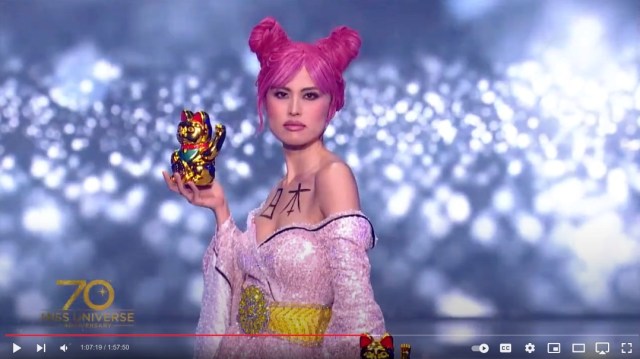
“Cool Japan” take on national costume criticised as an “insult” to Japanese culture.
The 70th Miss Universe pageant was held at Universe Dome in Eilat, Israel, this year, with 80 contestants from around the world vying to take home the title.
Here in Japan, all eyes were on the Japanese contestant, Juri Watanabe, when she strutted out on stage in front of millions for the National Costume Show on 10 December. While Watanabe looked amazing, and held herself with poise like the seasoned professional she is, people in Japan fired up about what she was wearing, with many calling it an “insult” to Japanese culture.
▼ Take a look at the Japan entry, cued up to play in the video below
As the host says in the video, the costume is designed to celebrate “the incredible Japanese Harajuku fashion culture“. This design inspiration is likely where the problems started, because rather than showcase the national costume to the world in a modern way that remains sensitive to the culture of the country, this costume ended up mashing together stereotypes that are known to rub people in Japan up the wrong way.
Some commenters noted that the beckoning cat figures and Sailor Moon-esque cosplay aesthetic played into the stereotypical image of “Cool Japan”, while others in tattoo-averse Japan wondered why “日本”, the kanji for “Japan”, was scrawled across the model’s chest. Others took issue with the Japanese flags on the sleeves and the chrysanthemum crest of the Imperial Family on the belt.
Another thing that bothered people was the way the kimono was folded over the model’s chest — right over left, which is only seen on kimono worn by dead people.
Seeing a kimono folded this way has a triggering effect on people in Japan, who make the connection with the deceased when they see it, so when it was shown on an international stage to represent their country, online commenters didn’t hold back with their opinions.
“Well — this is how a deceased wears a kimono; The chrysanthemum emblem is exclusive for the Emperor; Tattoos are taboo in Japan.”
“Don’t insult Japan!! Don’t insult Imperial House of Japan!! Don’t insult Kimono!!”
“It is a style worn by the deceased, so many Japanese people find it very uncomfortable. Is she dead?”
“To use this (chrysanthemum) symbol on a costume with the same pattern as the deadly [sic] costume is unbelievable to me. It is a horrible insult.”
“It seems that Japanese people weren’t involved in this at all, despite it representing Japan.”
“I can feel the designer has the great respect and admiration of Japanese culture but it seems there’s poor understanding of it…”
That last commenter is onto something there, because rather than have a Japanese designer come up with the costume concept and design, Israeli designer Aviad Arik Herman was enlisted for the job, to commemorate the 70th anniversary of the establishment of diplomatic relations between Japan and Israel.
However, the Embassy of Israel in Japan posted these photos of the costume, along with the designer, on 2 December, which suggests they didn’t have any issue with the design.
While the embassy and others involved in the Japan entry haven’t responded to the criticism, it’s likely they were pleased with the result, as Japan placed in the top 16. For critics in Japan, though, the results of a competition amount to nothing if it means the country’s culture ends up tarnished in the process.
And as for the costume being a “salute” to the one worn by Israeli pop star and Eurovision song contest winner Netta, well, her kimono-inspired outfit looked very different.
Source: Jin
Featured image: YouTube/Miss Universe
Insert images: YouTube/Miss Universe
● Want to hear about SoraNews24’s latest articles as soon as they’re published? Follow us on Facebook and Twitter!